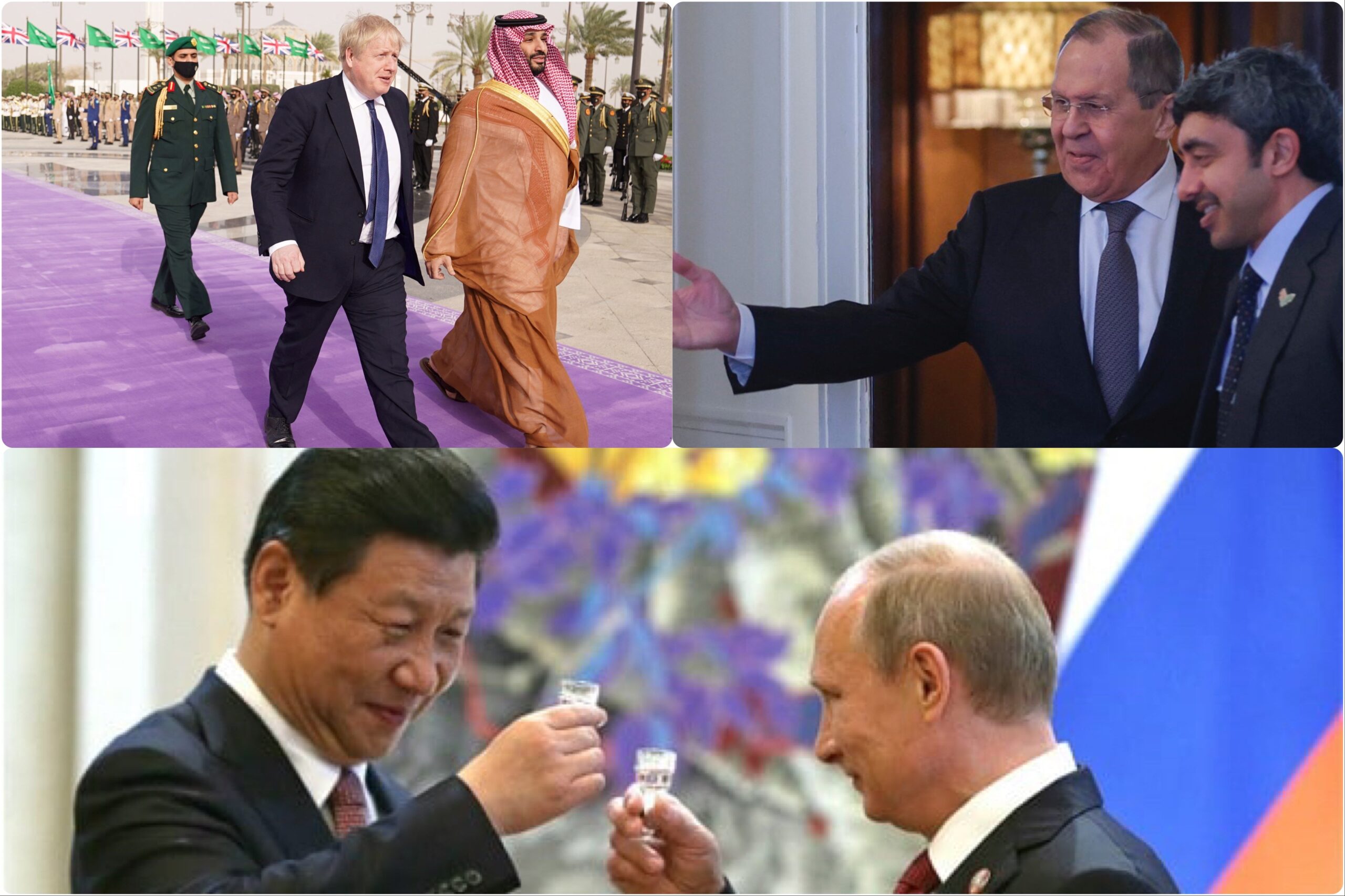Last week we saw that the Persian Gulf, especially the most potent oil and gas producing states in there are not siding with the West in the sanctions against Russia. They could largely ease the consequences of these sanctions on the global energy supply. Being so far reliable Western allies and utterly dependent on Western support, this much was expected of them, and surely calculated with. Yet for various reasons, and far from being united in their approach, they chose not to.
Quite the contrary, all on different levels and ways, they chose to disregard Biden’s pleas for increased oil and gas output. In a somewhat surprising gesture of defiance, insincere it might be at the end, they even extended their arms towards Russia. While the two most dominant oil producing states, Saudi Arabia and the Emirates chose not to talk to Biden, and even tacitly refusing the attempts to organize a tour for Biden in the Gulf, they kept intensive contacts with Moscow. And gave statements which could only be read as lightly sugar-coated support for Russia. At the same time the main gas supplier of the Gulf, Qatar showed a similar approach, while held high level meeting with Iran.
Many supposed that this only a “show”, a weak attempt to ask a hefty price for their support and at the end they will give in. Such utterly dependent states could only test Washington’s grip on them, but could hardly put up serious resistance if America really started to pressure them. So it would seem.
While with the war in Ukraine and the energy crisis caused by the sanctions are dragging on, it was estimated that these positions would change. But even this is all a “show”, it still goes on today. Even showing new horizons for confrontation.
Round two: Johnson is coming
Even before the war started in Ukraine Washington tried to pressure Qatar for bigger gas supplies to Europe in case of a war, which was turned down. After the war started and the sanctions against Russia started to kick in, the oil prices skyrocketed. That prompted Biden to try to convince Riyadh and Abū Zabī to increase their oil output. But the Saudi and Emirati leaders didn’t even receive his calls. Since then it was alleged that White House officials try to organize a round trip for Biden in the Gulf in the soon future. As no news came about this plan it is safe to assume that this idea was received with an even lower enthusiasm in Riyadh and the Emirates. But while the U.S. has some space to take the consequences of the sanctions, many other key players cannot. Especially in Europe. At least if the idea of fully cutting Russian oil imports in Europe is still about to be pushed forward.
So it was time for another attempt, and this time not even by the phone. British Prime Minister Boris Johnson, another key actor in the economic war on Russia decided to act and took to the Gulf. On 16 March he first arrived in the Emirates, and at the same day went in Riyadh. In both states he was received by the de facto rulers, Crown Princes Muḥammad ibn Zāyid and Muḥammad ibn Salmān respectively, though in the first case way less ceremoniously. While in Riyadh he at least held talks with the Saudi Energy Minister and signed some formal agreements, the visit to Abū Zabī was even less triumphant, and very tellingly, not many pictures were published.
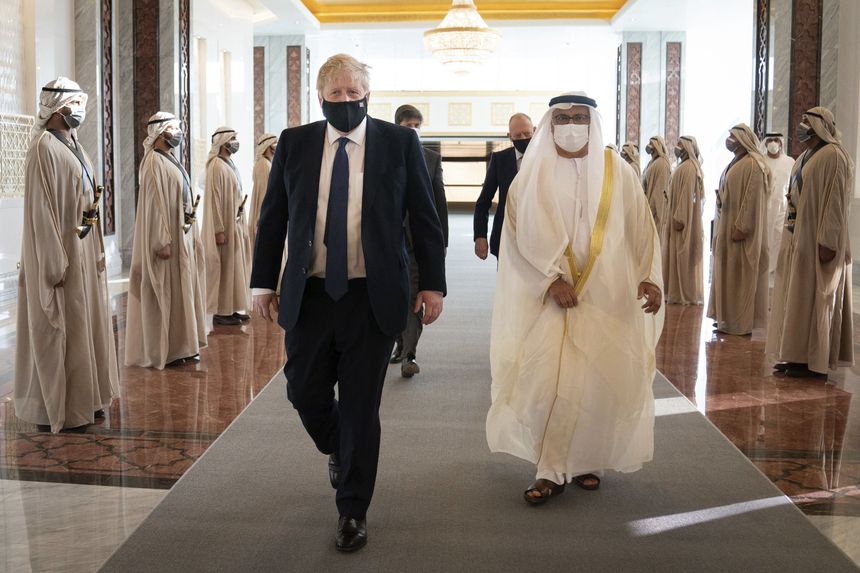
He held lengthy press conferences and speeches about the necessity of cooperation and good understanding. But how successful was that? The response came almost immediately, as the very next day Abū Zabī Crown Prince Muḥammad ibn Zāyid sent his brother, Foreign Minister ‘Abd Allah ibn Zāyid to Moscow. He was received warmly by his Russian counterpart Lavrov, and confirmed the continued cooperation with Russia. Even more, he suggested new horizons for cooperation and even offered mediation in the Ukrainian crisis. Which is surely nothing more than a diplomatic gesture, but shows the cordial ties Abū Zabī is trying to build with Russia.
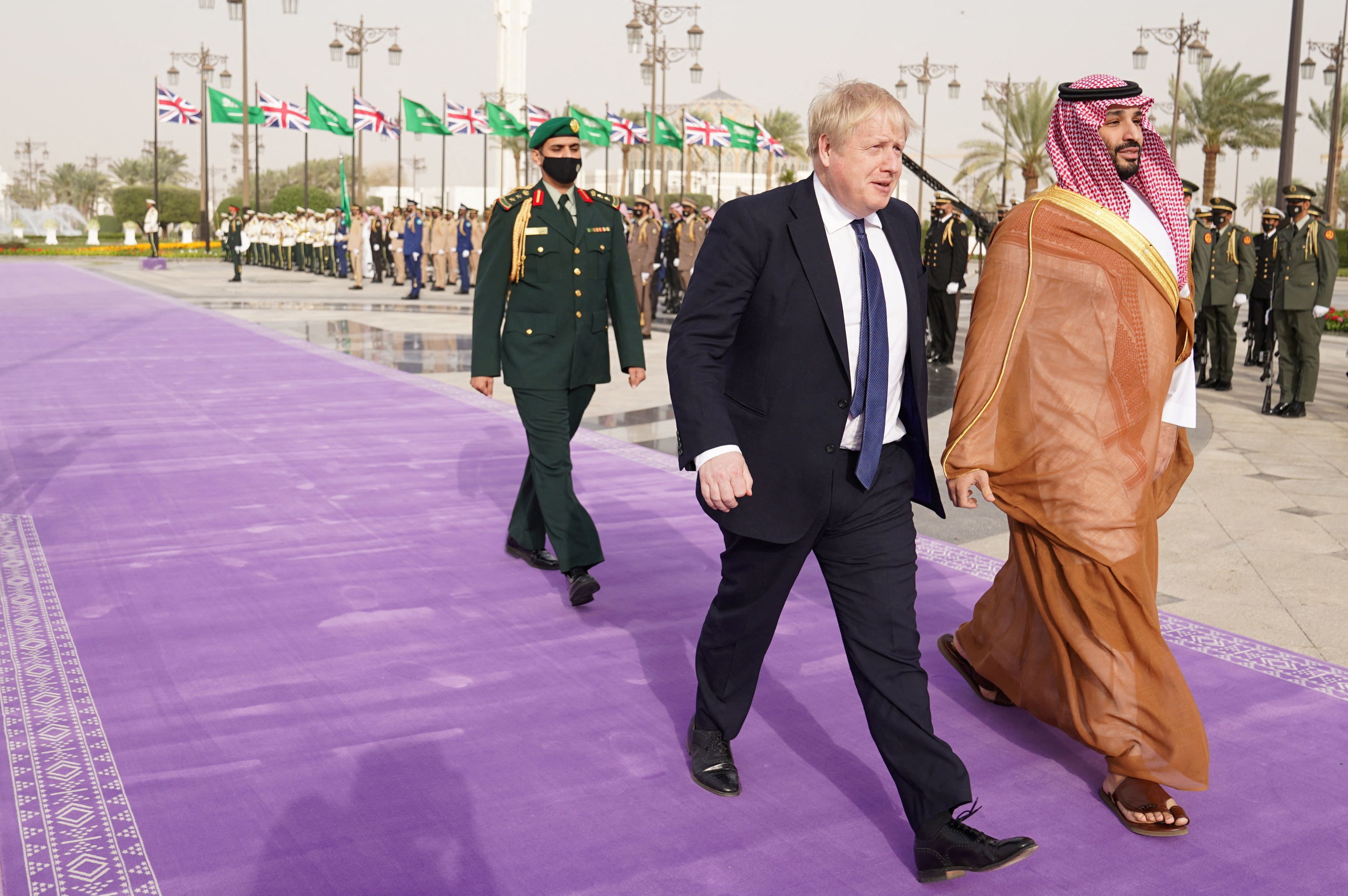
This gesture should not be overestimated, however. Given the sensitive structure of the Emirati leading elite, official Foreign Minister ‘Abd Allah ibn Zāyid mostly a protocol administrator, while critical negotiations are handled by the more capable advisors, like Anwār Qarqāš. Given Qarqāš, or an advisor in the same caliber was not sent to Moscow at the same time suggest that this trip was a courtesy move. Giving a response to London impossible to misunderstand on one hand, and reassuring Moscow on the other that Abū Zabī is not wavering in its resolve.
Even the Western sources had to admit that Johnson’s journey was a critical failure. So far the Gulf is not about to change its position.
A step further
It is hard to tell how much hope Johnson really had, but Riyadh also signaled its opinion right away. In a probably very intentional timing just one day before the trip news came out that Saudi Arabia considers accepting Chinese yuan in the oil trade with China. Considering that China is a huge market for energy commodities, such a shift can have huge implications for the whole global energy trade. This could seriously undermine the dollar’s absolute rule in oil trade, and further weaken Washington’s grip on its most crucial Gulf ally. It could also have detrimental affects on the dollar itself.
Considering that the Emirates is conducting similar talks with Beijing and their cooperation on security matters is already well developed, Riyadh’s suggestion is not an isolated step. Allegedly China has already tried to set up a secret military naval base in Abū Zabī, while recently also appeared on the Saudi military agenda as potential strong partner.
A step by Riyadh to accept yuan can have huge implications on the global oil trade, and indicates that the Gulf’s approach towards its financial and security considerations are changing. That is very telling in a time, when Washington is bogged down by weak leadership and the crisis in Ukraine.
The fact that Gulf is not about to help ease the burden of the economic warfare against Russia is one indicator that this war will not be easy. But this could still be successful, if Russia is indeed denied of its revenues on the long term, about which the Gulf can do little. However, recently Pakistan expressed that it is ready for deeper energy cooperation with Russia, while India stated that is about to invest heavily in the Russian energy sector. Added to that China also refrained from joining the sanctions and will likely to increase its Russian oil purchases. These together mean huge, so far largely underdeveloped markets for the Russian oil.
These two factors added together indicates that the sanctions against Russia will not only be extremely costly, but also largely ineffective. About that the example of Iran, a state largely struggling on its own for four decades, also much smaller and more exposed than Russia is very clear example.
Johnson no, al-Asad yes?
If anyone had any doubts how far this Gulf act of defiance goes, he surely got a shocking surprise on 18 March 2022. Only two days after the British Prime Minister got a very cold reception in the there Syrian President Baššār al-Asad arrived in the Emirates ahead of a prominent delegation. And he received a very warm welcome, incomparable with what Johnson received. All meaningful leaders of the Emirates met with President al-Asad, including Crown Prince Muḥammad ibn Zāyid and his brother, top intelligence chief of the state Ṭaḥnūn ibn Zāyid, and ruler of Dubai Prime Minister Muḥammad ibn Rāšid. The vast number of pictures and footages show a very cordial atmosphere.
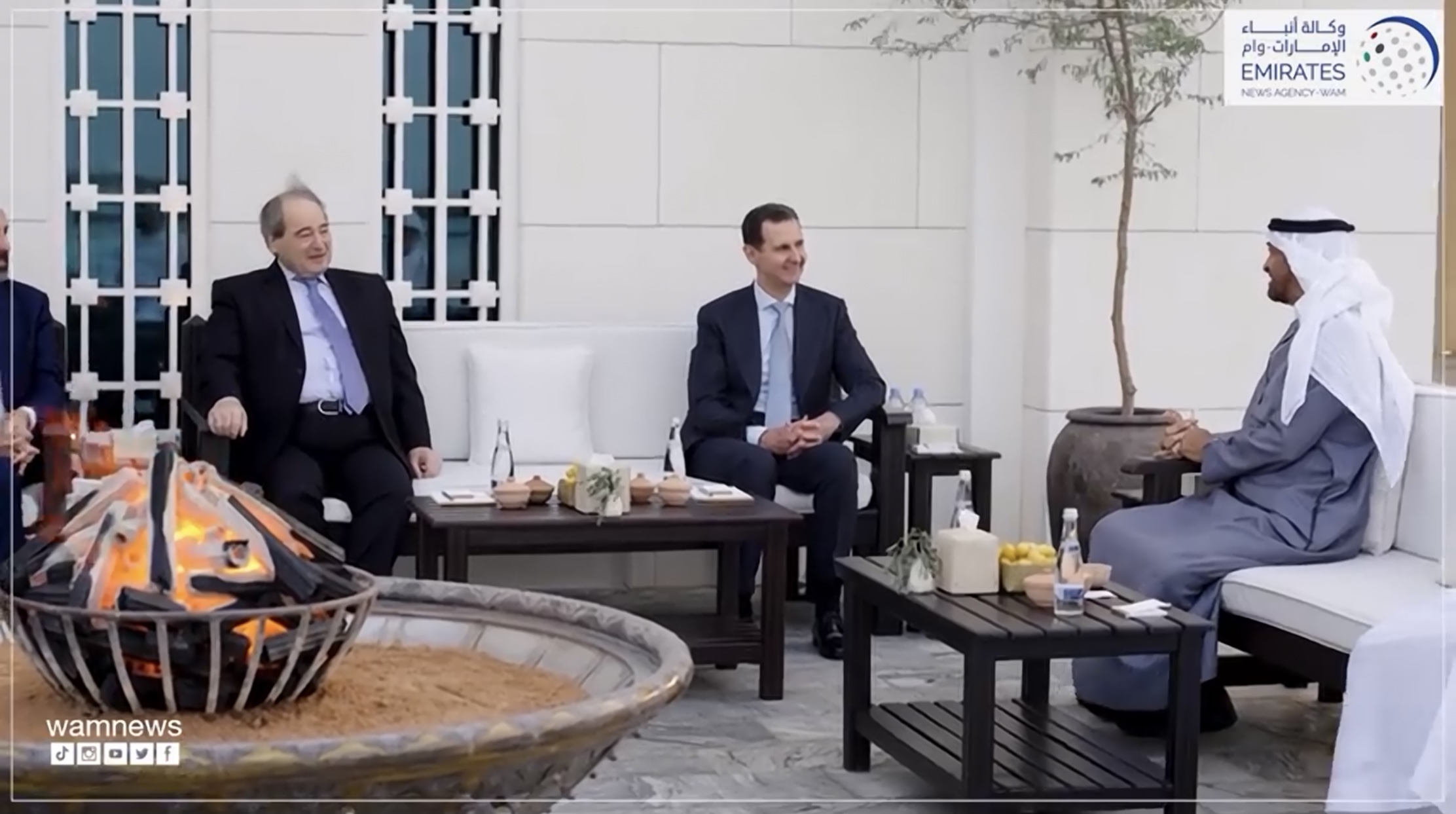
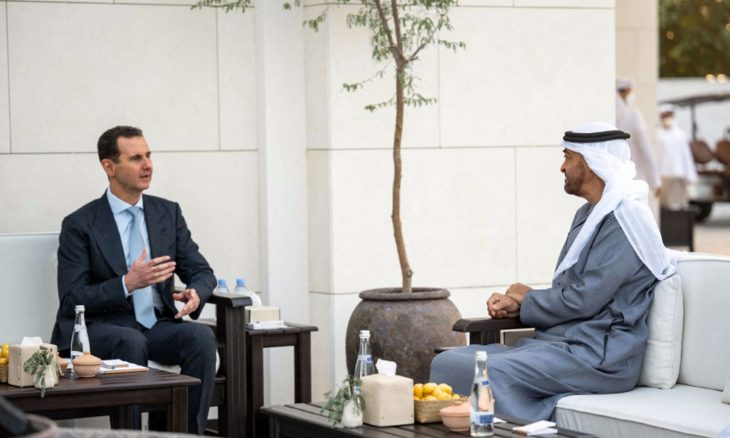
This was the first visit by the Syrian President to an Arab state since the beginning of the war against Syria in 2011, thus signaling that Damascus’ isolation is over. This is a turning point not only in the Syrian war, but in the Gulf’s policies towards it as well. Also shows the level of defiance by the Emirates toward the Western policies. And as we saw this is a trend now, not an isolated case.
The White House has already expressed it’s “disappointment” with the visit and the diplomatic move it means. But at this point being bogged down with far larger matters Washington has few cards to play.
This breakthrough in the Syrian-Gulf relations, however, has serious implications for our general topic as well. Syria is a very close ally of Russia, especially now. So a step towards it means a further step toward Moscow, while putting the so far warming Israeli-Gulf ties at hold. At least for now.
How far this can go?
As we see now, in such a sensitive time the Gulf is defying the Western policies, the West as a whole. It should stopped by now, but there is no indication for it. It is even going further.
The Gulf is opening channels for Russia and Syria, which is also an act of defiance, way beyond not joining the sanctions, which could have been reasoned by direct economic interests. At the same time the Saudi-Iranian rapprochement is also going well, despite all complications.
Given the implications for the whole global oil trade and for the stability of the dollar the Saudi initiative to accept yuan in its transactions should have been opposed by Washington. And it might come soon. But if it goes true, it will be a serious blow to Washington, and will mean that another pressure method against the Gulf will be lost.
Once again, it is unlikely that the so far rock solid American-Saudi alliance would end just now. But this is the beginning of the end. The longer this Gulf flirting with Washington’s key foes, like Russia and China, and now Syria goes on, the harder it will be to turn the wheels back. And so far there seems to be little indications that Washington can, or even willing to dedicate itself to restrain its Gulf allies.


